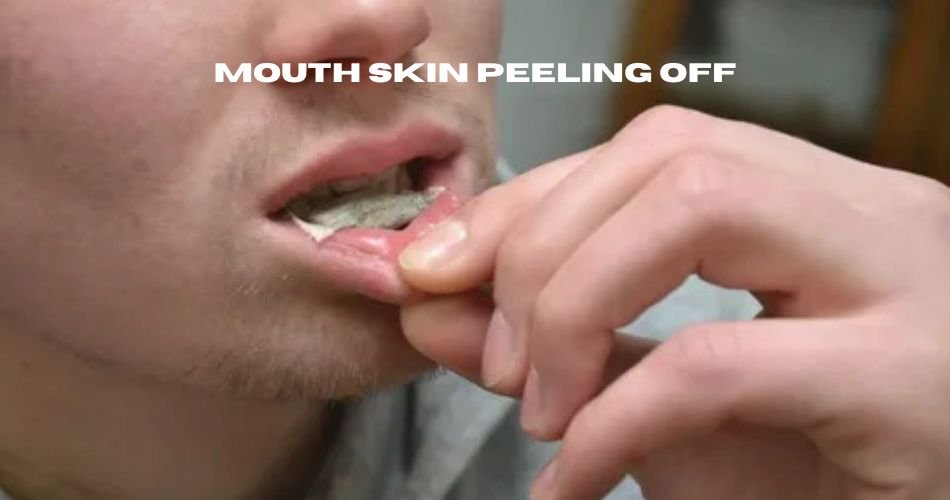When the skin inside your mouth begins to peel, it can be a very uncomfortable and even alarming experience. You may wake up one morning feeling a strange texture in your mouth, only to find thin layers of skin coming off your cheeks or the inside of your lips. While it may seem like a small issue, having the mouth skin peeling off repeatedly can point to underlying problems that range from minor irritations to more serious health concerns. Understanding what causes this condition, how to recognize its symptoms, and what you can do about it is crucial for maintaining your oral and overall health.
Understanding Why Mouth Skin Peels and Why It Should Not Be Ignored
Peeling skin inside the mouth often results from the body reacting to irritants or experiencing internal imbalances. It may be due to something as simple as using a harsh toothpaste or as complex as an autoimmune condition targeting the mucous membranes. The peeling may start with a tingling or burning sensation and progress to visible sloughing of the top layer of the skin inside the mouth. It’s essential not to dismiss it as a one-time event, especially if it keeps recurring. Even if the discomfort seems manageable, the root cause may need medical attention to prevent complications.
Dental Products and Their Hidden Ingredients That Trigger Peeling
One of the most overlooked causes of mouth skin peeling off is the use of dental hygiene products containing harsh chemicals. Ingredients like sodium lauryl sulfate (SLS), a foaming agent found in many toothpastes, can cause irritation in sensitive individuals. The reaction often starts subtly but leads to peeling skin in the mouth with repeated exposure. Switching to a gentler, SLS-free toothpaste or alcohol-free mouthwash can significantly reduce these symptoms. Many people find relief simply by identifying and eliminating the culprit in their oral care routine.
Foods That Might Be Doing More Harm Than Good to Your Mouth
What you eat plays a big role in your oral health, and that includes the integrity of the skin inside your mouth. Spicy dishes, acidic fruits, and overly salty snacks can irritate the mucous membranes. Constant irritation from such foods can lead to inflammation and peeling. In some people, citrus fruits like oranges and lemons trigger these symptoms, while in others, hot peppers or tomato-based sauces are the main offenders. If you notice the skin peeling off your mouth after eating certain foods, it’s wise to track your diet and identify your triggers.
Chronic Conditions Like Oral Lichen Planus That Cause Mouth Skin Peeling
Sometimes, the peeling isn’t caused by external irritants at all but by internal health issues like oral lichen planus. This chronic inflammatory condition creates white, lacy patches inside the cheeks and can lead to painful peeling and ulceration. The exact cause of oral lichen planus is still not fully understood, but it is believed to be an autoimmune response. Managing stress, avoiding known triggers, and using corticosteroid mouth rinses prescribed by a doctor are some of the ways to reduce flare-ups and discomfort associated with this condition.
The Link Between Autoimmune Disorders and Peeling Mouth Skin
Autoimmune diseases such as lupus, pemphigus vulgaris, or Sjögren’s syndrome can lead to peeling skin inside the mouth as the body begins to attack its own tissues. These conditions often come with a range of other symptoms, such as dry eyes, chronic fatigue, and joint pain. In the mouth, they may manifest as raw patches, dryness, and the sloughing off of the mucosal lining. These cases are usually managed by specialists through immune-suppressing medications and regular monitoring. If the peeling is accompanied by other systemic symptoms, medical advice should be sought immediately.
How Dehydration and Dry Mouth Contribute to Peeling Skin
One of the simplest yet most overlooked reasons for the skin inside the mouth to peel is dehydration. When your body lacks adequate fluids, your mouth becomes dry, making the tissue more vulnerable to cracking and peeling. This condition, known as xerostomia, is common among elderly individuals and people taking medications like antihistamines, antidepressants, or blood pressure medicines. Increasing water intake and using saliva substitutes or sugar-free lozenges can greatly improve this condition. Humidifiers in dry climates also help in preventing mouth dryness.
Overzealous Brushing and Poor Oral Hygiene Practices Can Backfire
Maintaining oral hygiene is important, but being too aggressive with your toothbrush can lead to unintended damage. Using a hard-bristled brush or brushing too frequently can wear down the delicate lining of your mouth, leading to microabrasions that later peel off. Similarly, harsh tongue scrapers or excessive flossing can also irritate the inner mouth. Switching to a soft-bristled toothbrush and being gentler during brushing can help prevent this. It’s not just about keeping your mouth clean—it’s about doing it in a way that respects the sensitivity of the tissues involved.
Medications That May Cause Side Effects Like Mouth Skin Peeling
Various prescription medications list mouth peeling as a potential side effect. Chemotherapy, certain antibiotics, and drugs used for autoimmune diseases can affect the lining of the mouth. These medications alter how the cells regenerate or cause inflammation that leads to peeling. If you notice mouth symptoms after starting a new medication, consult your healthcare provider. Do not stop the medication on your own, but do inquire about possible alternatives or supportive treatments to minimize this uncomfortable side effect.
The Warning Signs That It’s Time to Seek Medical Advice
While mild cases of peeling can often be treated at home, there are signs that warrant a visit to the doctor. If the peeling is accompanied by intense pain, visible sores that do not heal, swelling, or bleeding, it could point to a more serious condition. Persistent peeling that doesn’t improve with lifestyle changes should also be investigated further. In rare cases, oral cancers or severe infections may present in a similar way, so early diagnosis is crucial. Trust your instincts—if something feels off, get it checked out.
How Healthcare Professionals Diagnose the Root Cause of Peeling
When you consult a dentist or physician about peeling inside the mouth, the first step is a thorough examination. They’ll ask about your oral hygiene routine, diet, medical history, and any new medications. They may also examine for signs of systemic conditions. If needed, they might order tests such as a biopsy of the tissue, allergy tests, or blood work to check for immune system disorders. Getting a clear diagnosis helps ensure that the treatment is targeted and effective, rather than trial and error.
Effective Treatment Options for Immediate and Long-Term Relief
Treating mouth skin peeling depends entirely on the cause. For allergic reactions, the solution might be as simple as switching products. For chronic inflammation or autoimmune conditions, prescription medications like corticosteroids or immunosuppressants may be necessary. For dry mouth, staying hydrated and using specialized oral products can help. In many cases, a combination of treatments including dietary adjustments, natural remedies like aloe vera gel or coconut oil, and stress reduction techniques offer significant relief.
How to Change Your Lifestyle to Support Oral Health and Healing
Lifestyle plays a crucial role in preventing recurrence of mouth skin peeling. Hydrating regularly, avoiding known irritants, and maintaining a balanced diet rich in vitamins—especially B12, iron, and folate—are essential steps. Reducing stress through yoga, meditation, or regular physical activity can also help, as stress is known to aggravate inflammatory and autoimmune conditions. Creating a daily routine that supports healing rather than hinders it can be the difference between chronic symptoms and lasting comfort.
Precautions You Can Take to Keep Mouth Skin Peeling From Returning
Prevention is often more effective than treatment when it comes to oral health. Using mild, hypoallergenic oral care products, avoiding foods that trigger irritation, and staying on top of hydration can prevent recurrence. Routine dental visits are also key for early detection of issues. Don’t ignore the little changes—if your mouth starts feeling dry, sore, or sensitive again, act quickly before it turns into another full-blown episode of peeling.
What Parents and Caregivers Need to Know About Children and the Elderly
Both children and older adults have unique vulnerabilities when it comes to peeling mouth skin. Kids may experience it due to viral infections, mouth breathing, or rough brushing. Elderly people are more likely to deal with it because of medications, dry mouth, and age-related tissue thinning. Caregivers should be vigilant, ensuring gentle oral care, a balanced diet, and medical checkups tailored to each age group’s needs. Early intervention can prevent discomfort and complications down the road.
The Emotional Toll of Living with a Mouth Condition That Affects Confidence
It’s not just the physical discomfort that makes mouth skin peeling a problem—it’s the emotional toll. People may feel embarrassed to speak, smile, or eat in public when dealing with visible mouth issues. Social anxiety can develop, especially if symptoms persist or lead to bad breath or visible sores. Emotional support, therapy, or simply talking to understanding friends and family can help. Remember, you’re not alone, and with the right care, things can and do get better.
Why Believing Internet Myths Can Delay Real Treatment
There are many misconceptions online about mouth skin peeling. Some people think it’s just a vitamin deficiency, while others believe it’s a hygiene issue. These myths can delay proper diagnosis and treatment. Always rely on trusted medical advice rather than self-diagnosing based on social media posts or unverified blogs. Taking your health seriously is the best first step toward recovery.
Conclusion
Having the mouth skin peeling off can be a frustrating, painful, and often confusing experience. While it may begin as a minor annoyance, it can quickly become a persistent problem if the underlying cause isn’t identified and addressed. Whether it’s an allergic reaction to a dental product, an autoimmune disease, or simply a result of poor hydration, the key to effective treatment lies in understanding the root of the issue. By making smart choices with your oral care, adjusting your diet, staying well-hydrated, and seeking professional advice when needed, you can manage this condition successfully and keep your mouth healthy for the long term.






